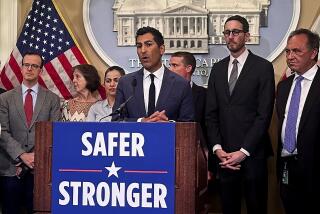Senate Votes to Cap Awards in Product Liability Suits
- Share via
WASHINGTON — Setting up another veto confrontation with President Clinton, a dozen Senate Democrats joined forces with a majority of Republicans on Thursday to give final passage to legislation that would limit the amount of money awarded in product-liability lawsuits.
But the 59-40 margin of approval would not be large enough to override the veto that Clinton has promised. Clinton’s opposition reflects, in part, pressure from trial lawyers, who are among his biggest contributors, and fears that he could lose votes in November to third-party candidate Ralph Nader--who has fought the bill--if he signs it.
The measure--a compromise worked out by a Senate-House committee--includes provisions contained in the GOP “contract with America.” It would cap punitive damages in most product-liability cases at $250,000 or twice the compensatory damages, whichever is larger. Businesses with fewer than 25 employees would be liable for the lesser of the two.
This version of the legislation has yet to come to a vote in the House, which is expected to approve it. The issue became a battleground for powerful interest groups, with trial lawyers on one side and businesses and their insurers on the other.
Before the Senate acted, Clinton hinted that he would sign a modified version of the legislation. But both supporters and opponents were skeptical that the measure could be altered enough to please the president while retaining enough votes to pass in both houses.
“Whether that is possible I don’t know,” said Sen. Joseph I. Lieberman (D-Conn.), who supported the bill. “This was such a delicate balance.”
Agreement was so hard to reach that the House and Senate conference committee labored 10 months to reconcile the differences between their versions of the bill.
The product-liability measure is one of several GOP initiatives that Congress intends to send Clinton this year, despite veto threats.
“It’s in their [Republicans’] interest to send things to the president that are just an inch off what the president can sign,” said Sen. John B. Breaux (D-La.), who opposed the product-liability measure. “Then he vetoes it and they think they have a political issue.”
The bill’s sponsors said that their intent was to reform product-liability laws to protect businesses and insurance companies--and by extension the consumers they serve--by making it much harder for juries to award excessive punitive damages.
“What we have tried to do . . . is to make a fair, reasonable balance between the interest of consumers and business,” said Sen. John D. “Jay” Rockefeller IV (D-W.Va.), a sponsor of the legislation. “This is fair. This is the way America ought to work. I can only pray that the president will sign it.”
Sen. Slade Gorton (R-Wash.), who managed the legislation on the floor, said that the present system is “a lottery for plaintiffs and a bonanza for those who represent them.”
But opponents of the measure argued that the possibility of business-busting product-liability suits has forced manufacturers and retailers to be more responsible and has made America a safer place.
“Punitive damages have disciplined these businesses,” Sen. Ernest F. Hollings (D-S.C.) said.
For the president to embrace product-liability legislation, according to a senior administration official, the measure would have to give judges the authority to waive the cap on punitive damages. The measure passed by the Senate would permit judges such discretion but only in exceptional cases, which the administration considers too limited.
The administration also opposes a provision in the measure that specifies that if several companies are held liable for damages, a single company can only be charged the share of damages corresponding to its share of the responsibility. For instance if a store sells a defective item and a court finds that the store bears 10% of the responsibility for the damage, it can only be held responsible for 10% of punitive damages, even if the manufacturer has gone bankrupt and cannot pay.
More to Read
Get the L.A. Times Politics newsletter
Deeply reported insights into legislation, politics and policy from Sacramento, Washington and beyond. In your inbox twice per week.
You may occasionally receive promotional content from the Los Angeles Times.










